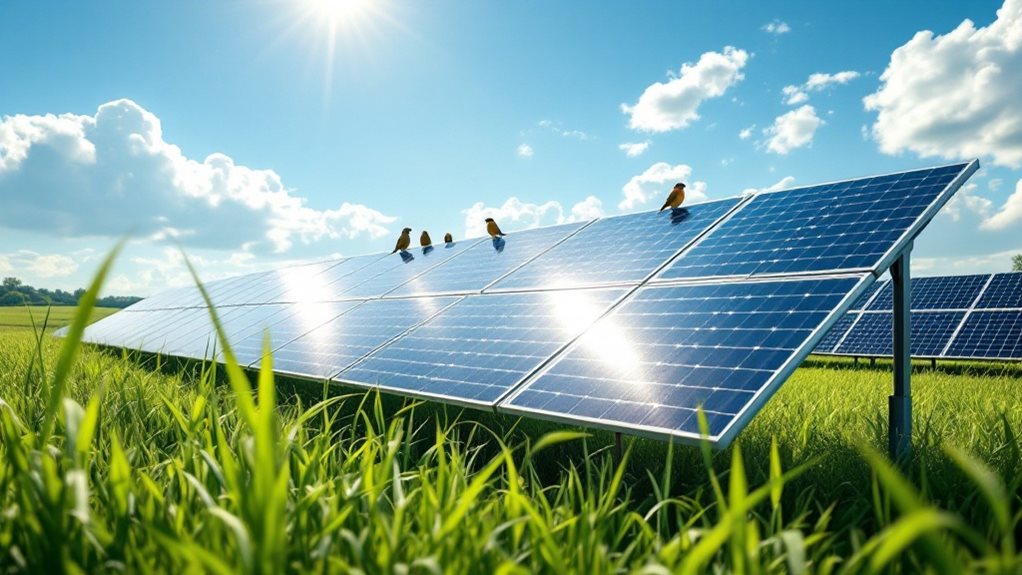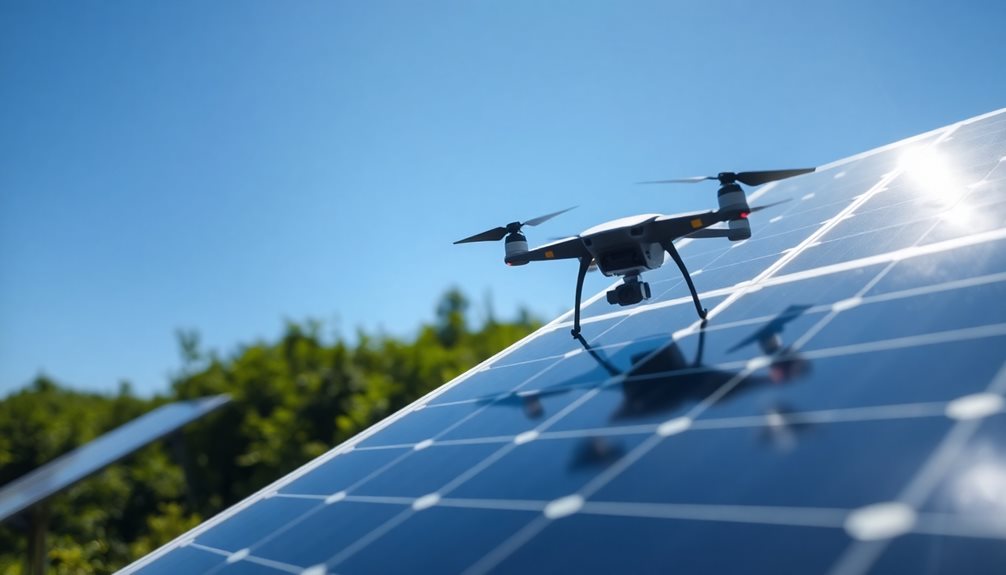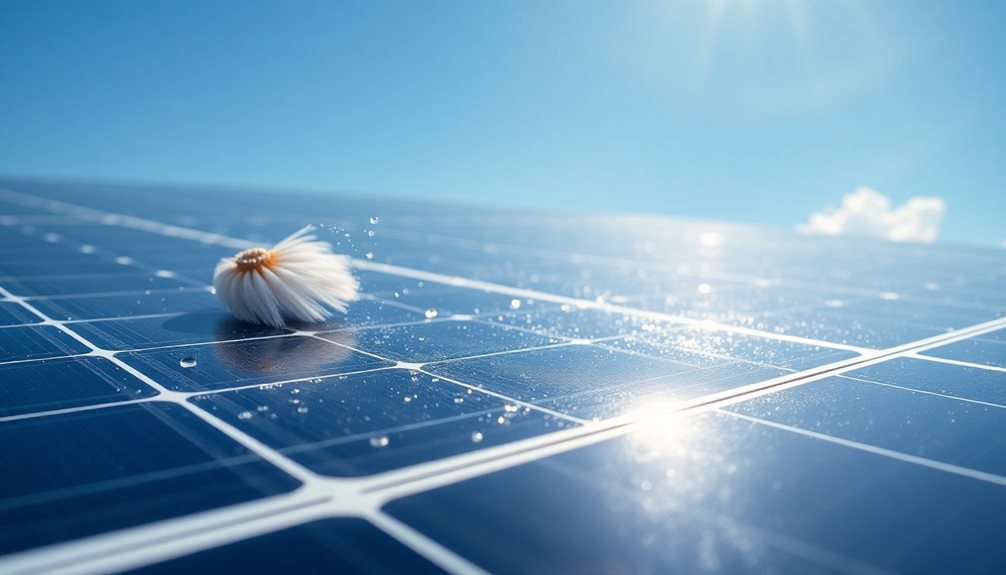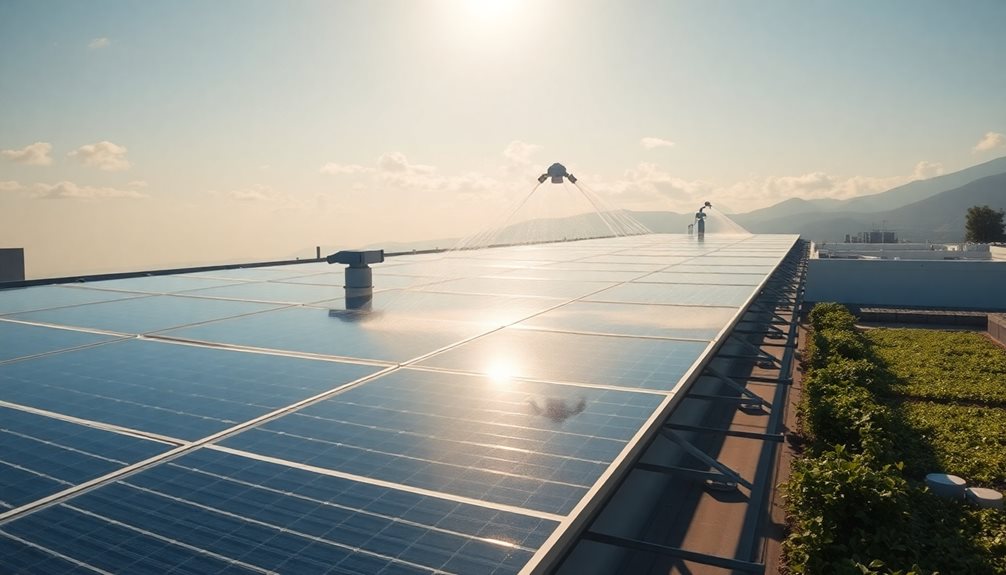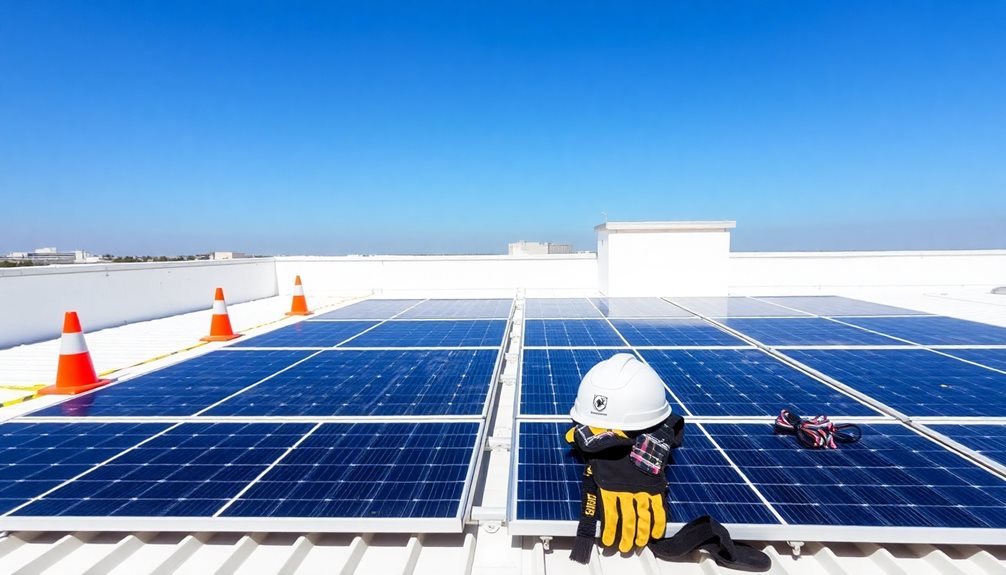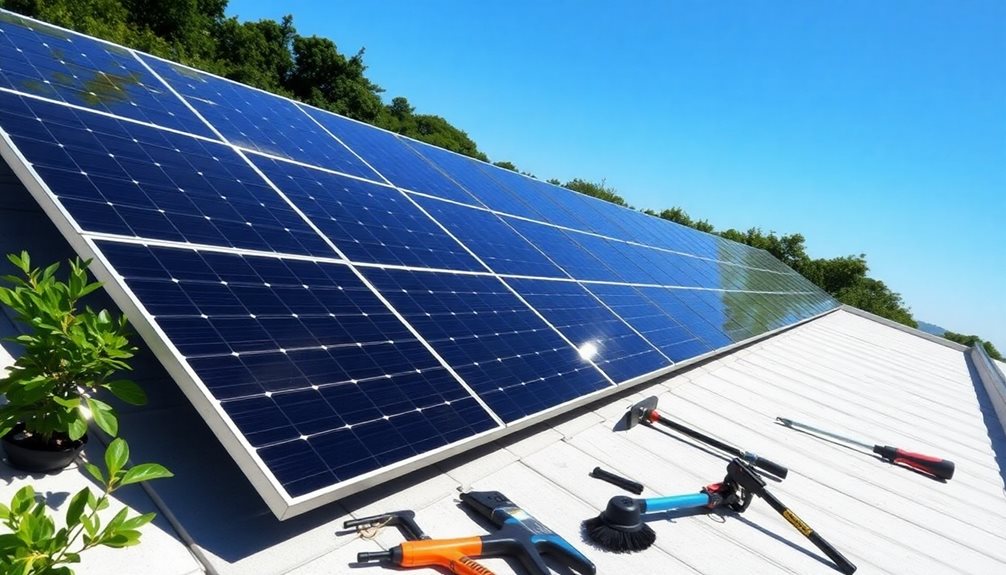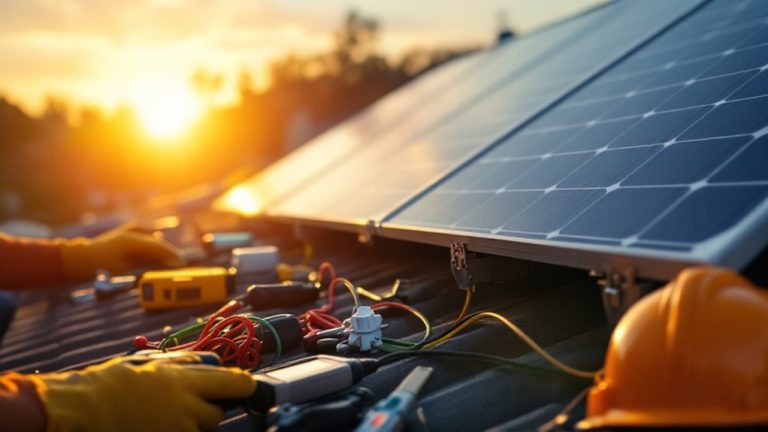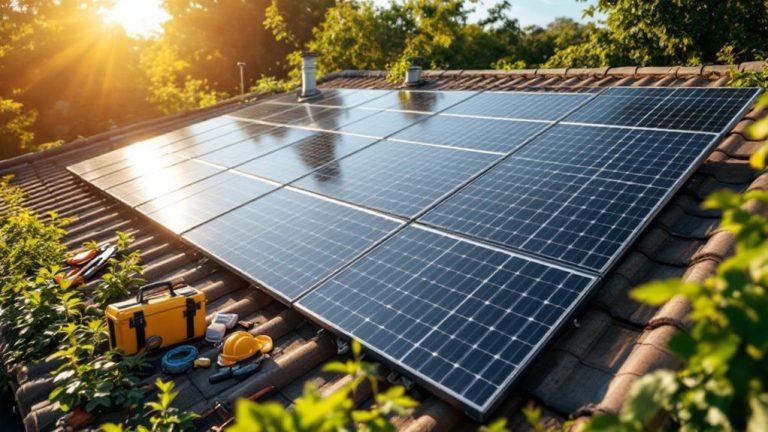Post-installation maintenance of solar panels involves a series of essential tasks to guarantee ideal performance and durability. Begin with installation checks, confirming proper breaker sizes, securing connections, and inspecting inverters. Conduct routine visual inspections to identify structural damage or shading issues, utilizing thermal imaging to detect hidden defects. Cleanliness is critical; panels should be washed every six months with mild soap and water, or consider automated systems for larger setups. Safety is paramount during manual cleaning—turn off the system before maintenance. Professional services can enhance efficiency in high-pollution areas. To uncover further strategies and techniques, continue exploring.
Expert Highlights
- Conduct bi-annual or quarterly visual inspections to identify structural issues and secure connections.
- Clean solar panels every 6 months using soft brushes or garden hoses with soapy water for optimal efficiency.
- Use thermal imaging tools during inspections to uncover hidden defects like shading or connection problems.
- Utilize automated cleaning systems or robots to enhance efficiency and reduce labor costs in cleaning.
- Regularly inspect inverters, controllers, and ensure accessible disconnect switches for the system's proper functioning.
Installation Checks
Ensuring proper installation is paramount for the long-term efficiency and safety of solar panel systems. Appropriate electrical system checks include verifying the correct breaker, wire, and conduit sizes, along with ensuring secure connections and accessible disconnect switches. These checks also include inspection fees, which may be covered by permit fees depending on local government regulations. Physical system integrity is maintained by securing PV modules and managing vegetation. Component checks involve inspecting inverters and controllers, ensuring they function properly and display no signs of damage.
Visual Inspections
After confirming system integrity through installation checks, attention should shift to regular visual inspections to maintain solar panel performance. Manual inspection highlights visible damage while component checks focus on structural elements, shading issues, and secure connections. Visual inspections are simple and easy but may overlook minor flaws, necessitating more comprehensive testing methods. Utilizing thermal imaging tools can reveal hidden defects. Scheduled inspections—often bi-annual or quarterly depending on conditions—are crucial to guarantee ideal functionality and address any post-event damages.
Cleaning Methods
Regular cleaning of solar panels is essential to maintain their efficiency and longevity. Optimal cleaning frequency is about every 6 months to ensure that performance remains high. Employ soft brushes or standard garden hoses with soapy water to gently cleanse panels without causing damage.
In pollution-heavy areas, more frequent cleanings are required, ideally using professional services utilizing pure water systems. This organized maintenance approach guarantees panels remain free from dirt, maximizing output and fostering a sense of communal commitment to sustainable practice.
Manual Cleaning Steps
Before commencing the manual cleaning process, gather all necessary materials, including a water hose, soap, a soft cloth, a brush, or a sponge, ensuring safety equipment is readily available to prevent accidents. Turn off the solar system, then spray water at moderate pressure, ensuring minimal temperature difference. Solar panel productivity can fall by 30% if not cleaned for six months, making regular maintenance crucial for maximizing performance. Apply a soap solution on one section, gently cleanse with a soft cloth, and rinse thoroughly, ensuring safe operations.
Automatic Cleaning Options
Employing automated cleaning options for solar panels offers a sophisticated solution to maintaining ideal performance and longevity. These systems, featuring technologies like artificial intelligence and thermal cameras, autonomously clean 24/7, reducing labor costs while enhancing efficiency by preventing corrosive buildup. Robots such as SolarCleano F1A and IFBOT X3 adapt to diverse environments, ensuring seamless operation across various solar panel systems and promoting sustainable energy production. SolarCleano's robots boast 20% more cleaning capacity than similar technologies, making them a powerful tool in maximizing solar panel efficiency.
Maintenance Frequency
After exploring automated cleaning options, understanding the best maintenance frequency becomes essential for maximizing solar panel efficiency.
Experts recommend a cleaning schedule tailored to location and conditions:
- Clean every six months or more frequently for dusty areas.
- Seasonally clean four times a year for ideal results.
- Inspect panels yearly.
- Schedule based on power production rates.
- Consider professional servicing every 5-10 years.
Safety Precautions
Safeguarding the safety of workers is paramount during the installation and maintenance of solar panels, especially given the range of potential hazards involved. Extensive safety measures, including the use of personal protective equipment (PPE) and adherence to electrical safety protocols, are vital.
Inspections guarantee equipment reliability, while safety briefings reinforce procedures. By maintaining these standards, we cultivate a secure, inclusive environment for all involved in solar panel maintenance.
Essential Tools
A selection of essential tools is crucial for effective maintenance of solar panels, ensuring they remain clean and efficient. These tools preserve panel integrity and optimize performance.
Key items include:
- Soft Bristled Brushes: Prevent scratches.
- Squeegee: Removes water effectively.
- Non-Abrasive Cleaners: Protect panel surfaces.
- Telescopic Poles: Access high panels safely.
- Purified Water Systems: Avoid mineral deposits.
These tools foster a proactive maintenance culture, enhancing solar efficiency.
Professional Services
While having the right tools is fundamental for maintaining solar panels, engaging professional services can substantially enhance the longevity and performance of your solar energy system.
Inclusive preventative services, such as inverter repairs and PV solar system commissioning, guarantee ideal operation. Expert inspections paired with regular cleaning eliminate debris, while customized maintenance plans and efficiency upgrades can identify and resolve issues, preserving operational preeminence for community solar initiatives.
Monitoring and Maintenance
Effective monitoring and maintenance are cornerstone practices for maximizing the efficiency and lifespan of solar panel systems. By employing various tools and techniques, one can guarantee ideal performance and address potential issues timely.
Key methods include:
- Data Loggers: Collects data from sensors.
- Inverter Monitoring Systems: Tracks energy remotely.
- Remote Monitoring Software: Offers real-time analytics.
- Cloud-based Systems: Allows convenient access.
- Sensor-based Monitoring Systems: Provides real-time data.
FAQ
How Can I Increase Solar Panel Efficiency Beyond Regular Maintenance?
To enhance solar panel efficiency, consider strategic system enhancements such as employing high-efficiency panels, solar trackers, microinverters, and smart inverters alongside advanced energy management solutions, like solar batteries, optimized system monitoring, and smart home technology integration.
What Factors Affect the Life Span of Solar Panels?
Several factors influence solar panel lifespan, including environmental conditions such as extreme weather and UV exposure, material quality like silicon type and encapsulant durability, installation precision, and ongoing maintenance practices essential for mitigating degradation and maximizing efficiency.
Are There Cost-Effective Upgrades for Existing Solar Panel Systems?
Cost-effective upgrades for existing solar panel systems include adding power optimizers, upgrading inverters, and considering battery storage, which increases costs but enhances system efficiency. Evaluating energy needs and solar production helps justify initial investment and long-term savings.
How Do Weather Conditions Impact Solar Panel Performance?
Weather conditions greatly affect solar panel performance. High temperatures reduce efficiency, while cloudy days lower production. Cold climates enhance efficiency, and wind aids cooling. Rain cleans panels, improving performance, whereas humidity necessitates regular maintenance to prevent degradation.
Are There Innovations Improving Solar Panel Durability?
Innovations in solar panel durability include the development of perovskite solar cells with enhanced longevity, environmental-friendly lead-free alternatives, and advanced protective coatings. These advancements greatly extend panel lifespan and performance, fostering their wider adoption in global communities.
Experts Final Thoughts
In summary, effective post-installation maintenance of solar panels is critical to guarantee maximum performance and durability. By conducting regular installation checks and visual inspections, the integrity of the system can be preserved. Employing appropriate manual or automatic cleaning methods further enhances efficiency. Adhering to strict safety precautions and utilizing the essential tools will safeguard both the system and personnel. Engaging professional services and employing continuous monitoring will aid in the early detection of faults and facilitate prompt corrective actions.





